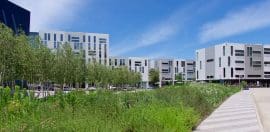Philanthropic Leader Calls to Overhaul Economic System

13 September 2018 at 8:52 am
A philanthropic leader wants to take philanthropy to “the next level” and address “the flaw at the heart of economics”, by overhauling the capitalist economy to see the measurement of social and natural resources standardised, and traded alongside financial capital.
Founder and funder of the Universal Commons Project (UCP), Alan Schwartz AM, spoke to Pro Bono News following his speech at the Philanthropy Australia conference, where he addressed the flaws of the current capitalist economic system.
He said the system did not “reflect the potential impact” or activities of the social sector, and that social and natural resources had been excluded and labelled “externalities”.
“Profit is not equal to value, and that creates massive distortions. It doesn’t reflect social impact, or harms on people’s health or the environment, or on the other side activities of the social sector or government which improves things like literacy or health,” Schwartz said.
Listening to Alan Schwarz on a big idea -the Universal Commons exchange project to get business profits to fund a universal wage .Social & natural capital belong to us. all#PA2018Conf pic.twitter.com/OoHiPladZS
— Jane Jose (@JaneJose_author) September 6, 2018
Director of Social Ventures Australia, Simon Faivel, told Pro Bono News he welcomed any idea that raised the importance of value over profit.
“While this isn’t a new idea, we think someone like Schwartz has the influence to get this idea off the ground,” Faivel said.
In the Universal Commons “Master Document”, it said “social and natural resources that contribute to both economic activity and to human wellbeing” were often not measured or identified, and were treated as “externalities”.
“This impairs the ability of individuals and organisations to prevent the depletion or improve the quality of those resources,” the document said.
“As such, a crucial step in the UCP is the process of converting social and natural resources into what we call social and natural capital, and codifying them in such a way that they can be factored into financial decisions.”
The UCP was created to try and “internalise” issues such as “health, literacy, trust, clean water and biodiversity” into commercial decision making, to create a “social and natural capital”.
“The Universal Commons will fix our economy by ensuring that profit and genuine value become one and the same,” the UCP website said.
Schwartz believed the world “had moved on” but economics had not, and the system needed a “fix”, by bringing “externalities into the market”.
He said there was a series of steps to be taken before this economic overhaul could occur, and finding a way to measure impact was top of the list, so the idea could be taken seriously.
As this standardised system does not exist currently, the UCP launched a “measurement prize” for the public to put forward their ideas to a committee of philanthropists, impact investors and people within the social sector.
“What I want out of it is a conversation around the importance of objective and universally accepted measurement, and the value of a prize is that it will encourage people to think about [measurement] as a science,” he said.
Faivel said there were definitely challenges with this first task.
“Finding a standardised way to measure impact will be tricky, but I’m interested and excited to see what they come up with,” Faivel said.
Schwartz believed the role of the social sector in moving this idea forward was to “have conversations about measurement” and the role it plays.
“There’s literally thousands of projects around the world focused on measuring different aspects of social and natural capital for the purposes of acquitting a grant, all for government to know that their money is spent properly,” he said.
Faivel added it was important to identify which part of the sector could assist.
“The social sector is big, so you need to identify which areas could put resources into this idea and help it succeed,” he said.
Schwartz said currently, no one, not even UCP knew the answer to this issue, but he believed there were people out there that could do it.
After a decision is made about a standardised measurement, the next challenge would be to create a “marketplace” exclusively for social and natural capital, to be traded and sold, similarly to the stock market.
While Schwartz acknowledged this was a long term goal, he said it was possible.
“We think it’s possible… but it’s not going to be overnight,” he said.
This is the first of a two part article, examining the economic overhaul proposed by the Universal Commons Project.
In part two, we will look at how social and natural capital will make it into the mainstream marketplace.








The Mandarin (13/09/18) carries an article on ‘social return accounting’ which has some relevance to this. Rosalind Dixon and Richard Holden from the University of New South Wales have developed a new methodology that expands on the existing concept of social return on investment (SROI) by taking physical infrastructure into consideration as well as intangible forms of human or social capital.